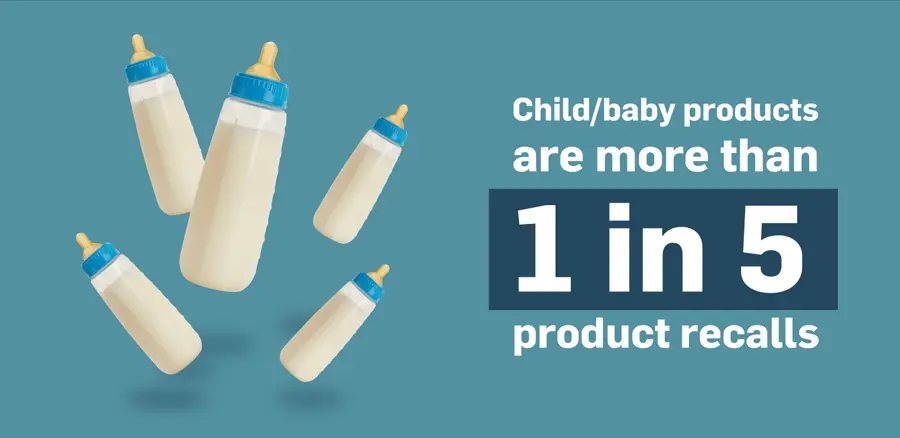
GxP Lifeline
Quality First: Consumer Product Recalls Have Risen 115% Since 2018

Anyone who has eaten commercially available food, used a health care or beauty product, or fed their pets has benefited from precise manufacturing systems. Especially if they do these things without stopping to consider whether the products were possibly flawed or tainted.
Manufacturing systems are not immune from mistakes or problems — and sometimes those issues are severe enough to necessitate recalls. Recalls are an important tool for regulators to ensure consumer safety, and they influence our levels of trust in products much more often than most consumers understand.
In highly regulated industries like food, drugs and medical devices, manufacturing companies invest a lot of money in people and products so they don’t have to face costly and damaging recalls. It’s a virtuous cycle that has consumer safety at heart.
So, what does it mean for both manufacturers and consumers that product recalls have seen a significant spike over the past several years?
The Current State of Recalls
We recently dove deep into publicly available data about recalls in the U.S. from the U.S. Food and Drug Association (FDA) and the Consumer Product Safety Commission (CPSC). Our goal was to better understand the regulatory environment and get a clearer sense of how often companies had to recall products.
We were shocked to discover that recalls across the FDA and CPSC are up 115% since 2018.

During that time frame, the FDA has initiated more than 1,000 food and drug recalls and the CPSC has initiated more than 1,500 product recalls. Overall, the market is on track to hit 443 recalls across both agencies by the end of 2023, which is a significant jump from pre-pandemic levels.
Understanding Why Products Are Recalled
Child safety is the leading cause of recalls for the CSPC, with more than one in five recalls involving child and baby products — more than any other category.

The most-recalled products by the FDA are food and beverages, by a large margin. These are followed by drugs, animal and veterinary products, and medical devices.

Allergens are the most common driver of recalls by the FDA, driving 34% of instances. The CPSC recalls more products for fire hazards than any other reason, at 24%.

Overall, about one in five FDA recalls are the result of problems that arise during processing or for contamination concerns. Nearly 30% of FDA recalls can be attributed to quality management issues.

Considering Some Mysteries in the Data
Recalls on baby formula made major headlines across the country in recent years as parents in some instances were met with bare shelves and struggled to find safe products. At the same time, there were twice as many recalls on pet food and animal products in the past five years than those issued issued for baby formula. Baby formula has been recalled eight times since 2018, compared to 16 animal food recalls for formulation over the same period.
Why do we hear so much about formula recalls and so little about pet food recalls?

Diving deeper, we find that scale may be one of the drivers of this attention disparity. While there are many animal food producers and multiple options for alternatives in the event of a recall, there are just a small number of formula manufacturers. Any large-scale recall is much more likely to be disruptive to the market and disastrous for parents. It’s also worth considering that several of the pet food recalls were for bird seed, a much less common household pet than dogs and cats.
Another anomaly we spotted is the percentage of recalls stemming from medical devices. In recent years, medical device manufacturing has been painted by some as a wild, underregulated industry, which produces mostly dangerous products as a result.
However, our report indicated that only 4% of FDA recalls were for medical devices. While the subject of product recall management in medtech needs a deeper dive to understand the full scale and impact of these recall numbers, it could point to a positive upward trend. There are certainly bad actors in every industry, but medical device manufacturing may also be more reliable than expected.
Searching for the Cause of the Spike in FDA Recalls
We can look at a few possible drivers to help understand the timing of this recent spike in recalls.
First, the data seems to indicate that allergens are becoming a major stumbling block for manufacturers. Foods with undeclared or mislabeled allergens are recalled 1.6 times more often than products recalled for foodborne illnesses.

Additionally, the Food Safety Modernization Act (FSMA) was signed into law in 2011 and was the most significant reform to food safety laws in over 70 years. This act enshrined much stricter regulations over time and increased the FDA’s ability to issue recalls to manufacturers. Given that food and beverage instances rose more than other areas overseen by the FDA, this seems to point to the FSMA as a likely source.
Finally, stricter guardrails enacted during the pandemic may also account for some of the spike. Much of the testing and inspection work was conducted remotely during COVID, and the FDA had to adopt more cautious policies in order to continue ensuring public safety.
Where Does the Data Take Us from Here?
Compiling, sorting, and contextualizing this data gives us a unique understanding of the regulatory environment and helps us visualize the recent spike in product recalls. This first look should also help companies understand the need to prioritize quality management as the core component of product recall management, whether that be keeping more accurate records, enacting tighter controls, or advancing systems with technology.
Companies that take advantage of quality management and manufacturing execution software - like MasterControl’s full-service technology platform — have seen reductions in data integrity errors by as much as 90%.
As a global leader with more than 30 years in life sciences and over 1,100 customers around the world, MasterControl is ideally positioned to help you carefully manage and perfect your process. Everything we do is designed to help you develop, manufacture, and commercialize life-changing products that help people live longer, healthier, and more enjoyable lives.
To learn more about how MasterControl can help your business, click here.

